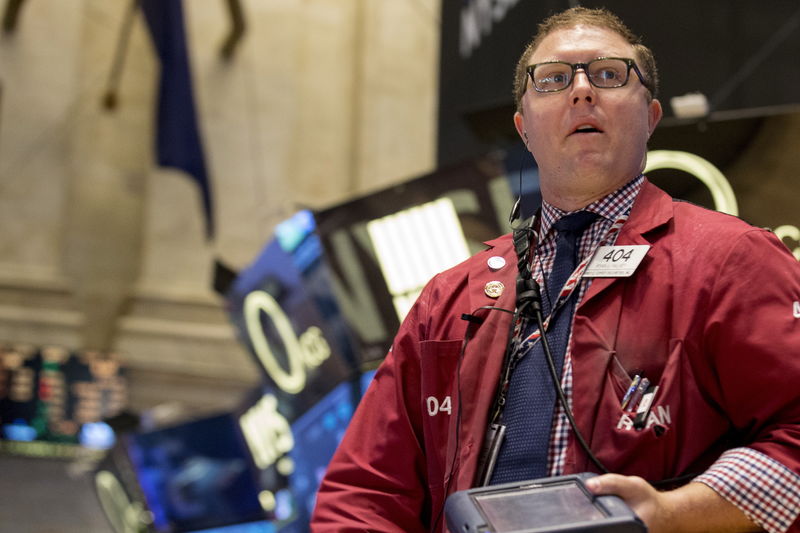Wall Street was setting up for a tough start to the week on Monday, with Dow Jones Industrial Average futures down roughly 500 points as China moved to raise tariffs on U.S. goods and take other retaliatory measures after Washington last week raised duties on $200 billion of Chinese imports.
How did the benchmark indexes fare?
Dow futures
YMM9, -1.91%
496 points, or 1.9%, to 25,648, while S&P 500 futures
ES, +1.86%
dropped 57.80 points, or 2%, to 2,829.10. Nasdaq-100 futures
NQM9, -2.53%
slid 192 points, or 2.5%, to 7,418.25.
On Friday, the Dow Jones Industrial Average
DJIA, +0.44%
rose 114.01 points, or 0.4%, to end at 25,942.37, recovering from a deficit of more than 350 points. The S&P 500 index
SPX, +0.37%
gained 0.4% to 2,881.40, while the Nasdaq Composite Index
COMP, +0.08%
climbed 0.1% to 7,916.94.
For the week, the Dow fell 2.1%, its biggest weekly loss since March. The S&P saw a 2.2% weekly fall and the Nasdaq shed 3%, the biggest losses for both since the week ending Dec. 21.
Read: Why the stock market is at the mercy of the U.S. consumer
What drove the market?
Trade tensions that drove volatility for stocks last week were rebooting Monday, as investors faced up to the fact that a deal between the U.S. and China could take longer than they expected. Talks in Washington ended with no agreement on Friday.
After raising tariffs on $200 billion worth of annual Chinese imports from 10% to 25% on Friday, the Trump administration said it was ready to impose 25% tariffs on another roughly $300 billion worth of Chinese goods, or nearly all the remaining products Americans buy from China each year.
On Monday, Chinese officials announced retaliatory tariffs against the U.S., hitting $60 billion in annual exports to China with new or expanded duties that could reach 25%. Hu Xijin, editor in chief of China’s Global Times, a daily Chinese tabloid with ties to the Communist Party, reported on Twitter Monday morning that China may take further steps in the coming days and weeks.
In several tweets over the weekend, President Donald Trump argued that the U.S. was in an advantageous position over trade, though White House economic adviser Larry Kudlow admitted Sunday that “both sides” will feel the pain. His comment that Trump and China’s President, Xi Jinping, may meet at the Group of 20 international conference in June failed to soothe investors.
Trump early Monday continued to send tweets regarding the talks, arguing that there was “no reason” for U.S. consumers to pay tariffs and that companies would leave China to avoid the duties if a deal isn’t reached.
Chinese media over the weekend ran several editorials blasting the U.S. position and vowing that Beijing would stand firm in the talks.
Read: Chinese media says ‘fierce U.S. offensive’ over trade won’t work
Which stocks are in focus?
Shares of several companies perceived as sensitive to rising U.S.-China trade tensions were under pressure before the start of trade Monday, including Apple Inc.
AAPL, -1.39%
semiconductor firm Advanced Micro Devices Inc.
AMD, +2.76%
and Intel Corp.
INTC, -0.90%
Uber Inc. stock will remain in focus Monday, after the ride-hailing firm made its debut on the New York Stock Exchange Friday. After pricing at $45 per share, Uber stock closed down 7.6% at 41.57. Shares remain under pressure in premarket trade, down 6.1% before the bell.
Videogame publisher Take-Two Interactive Software Inc.
TTWO, +1.23%
and Tencent Holdings Ltd.
TCEHY, +1.51%
are both set to report earnings after the close on Monday.
What’s on the economic calendar?
At 11 a.m. Eastern Time, the Federal Reserve will release its survey of consumer expectations.
Boston Fed President Eric Rosengren and Fed Vice Chairman Richard Clarida were each set to speak at separate conferences on Monday, starting at around 9 a.m. Eastern Time.
What are strategists saying?
“Any good will to risk assets on Friday has faded through Asia, and there the preservation of capital is the overriding theme, although there is absolutely no panic,” said Chris Weston, head of research at Pepperstone.
“Protectionism and the impact that can have on demand can be hard to model, and it feels that with these dynamics in play the market will further de-risk, with traders wanting a return of their equity, as opposed to on their equity,” Weston added.
How are other assets trading?
Trade worries weighed on Asian markets, where the Shanghai Composite
SHCOMP, -1.21%
closed down 1.2% and other major indexes logged losses of 1% or more. Europe followed suit with the Stoxx Europe 600
SXXP, -1.16%
down 0.6%.
As investors backed out of equities, haven assets such as the Japanese yen got a bid, with the
USDJPY, -0.78%
rising 0.1% to ¥109.68 against the dollar
DXY, -0.23%
But gold
GCM9, +0.30%
slipped about 0.2%.
Oil prices
CLM9, +1.33%
were climbing after Saudi Arabia said two oil tankers were attacked near the Strait of Hormuz early Sunday.
See: Strait of Hormuz: Oil ‘choke point’ in focus as U.S. ends Iran waivers
Want news about Asia delivered to your inbox? Subscribe to MarketWatch's free Asia Daily newsletter. Sign up here.
Let's block ads! (Why?)
https://www.marketwatch.com/story/dow-futures-drop-over-200-points-as-u-s-china-trade-talks-appear-stalled-2019-05-13
2019-05-13 12:10:00Z
CAIiEGG5Qu8sd6lMViA7ZHM6pVUqGAgEKg8IACoHCAowjujJATDXzBUwiJS0AQ




